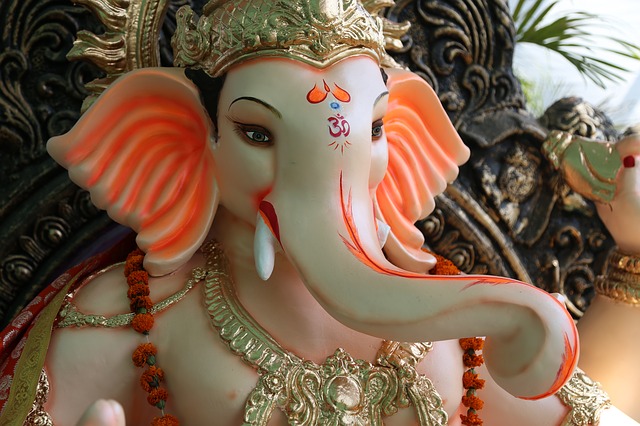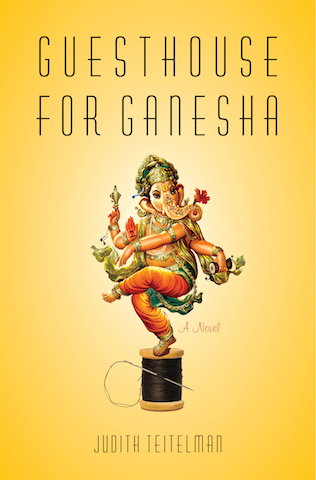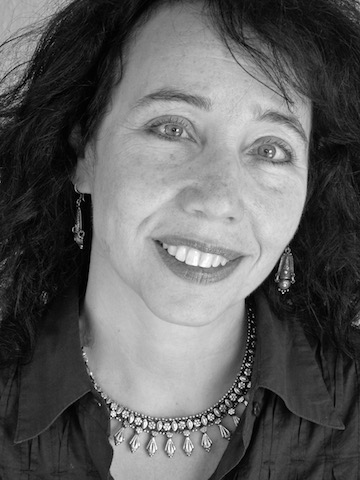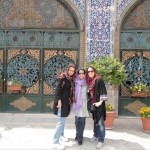Guesthouse for Ganesha: In Conversation with Author Judith Teitelman

Judith Teitelman never intended to be a creative writer. Working for over three decades in the nonprofit sector, she authored and published many professional reports, articles, proposals and such. She has had a successful career and, thanks to a fabulous high school English teacher, Judith has become a darn good writer. She was content with her life and skills; writing a novel was not even on her radar. But, as Judith remarks, “Life takes you in directions you don’t imagine.”
In 2001, when a friend started a Saturday morning creative writing group, Judith had no interest in attending, but finally gave in, due to her friend’s fierce insistence. Much to Judith’s surprise, during four years of Saturday mornings, Guesthouse for Ganesha gradually emerged. Judith refers to herself as, “yet another accidental fiction writer.”
 As she explains in her article, “18 Years But Who’s Counting,” her first novel, Guesthouse for Ganesha, took 18 years to reach publication. She says, “The book is not a memoir or autobiography at all. It is magical realism within the Jewish experience during the war and the Indian/Hindu perspective. It took 11 years to write and rewrite betwixt and between work, travel and everything else going on in my life. It took a year and seven months to find a literary agent, three-plus years to find a publisher and then a little over two years to publication.”
As she explains in her article, “18 Years But Who’s Counting,” her first novel, Guesthouse for Ganesha, took 18 years to reach publication. She says, “The book is not a memoir or autobiography at all. It is magical realism within the Jewish experience during the war and the Indian/Hindu perspective. It took 11 years to write and rewrite betwixt and between work, travel and everything else going on in my life. It took a year and seven months to find a literary agent, three-plus years to find a publisher and then a little over two years to publication.”
Guesthouse for Ganesha: In Conversation with Author Judith Teitelman.
Judith is comforted by her belief that “time is illusory and ephemeral. An abstract concept not grounded in constructs or form something that has changed over history and geography.” She feels that her novel needed time to marinate, to evolve. It could not be rushed.
I highly recommend Judith’s beautifully crafted novel. Esther’s character is timeless, and like the rest of us, she strives to be herself. She does not want to be a mother or a wife; she is an independent spirit and wants to be free. Judith cleverly explores the balance between the harsh realities of WWII and the lithe-childlike essence of Ganesha. The title, Guesthouse for Ganesha, refers to the belief that the earth is just a guesthouse for our souls; our time here on this planet is fleeting. The book is about being human. It speaks to everyone who has ever been devastated by a love. In other words, this book will speak to anyone alive right now.
Judith and I enjoyed chatting about the joys and challenges of her journey.
During the Saturday morning writing groups, as Guesthouse for Ganesha began to emerge, what was the story you wanted to tell? What is the background for your story?
One of the key sparks for the novel took place in the mid-80s when my maternal grandmother passed away. She was a mean and nasty woman, not the warm loving bubby everyone talks about. She was extremely difficult. I’m first-generation American, and a huge part of my mothers’ family was lost during World War II. My primary family members now live in Berlin. During the funeral, my tante, my grandmother’s youngest sister, said, ‘You know why your grandmother was so difficult, don’t you?’ I thought is was because she lost her husband, she was uprooted; she had to figure out how her children would survive.
At the funeral, I learned that when my grandmother was 17, she was standing under the chuppah (bridal canopy) in the center of her village waiting for the love of her life, her betrothed. When she learned he had run off with the richest girl in their village, she was crushed.
I wish I had known that! Forget the war, forget Hitler; it was devastated love. It was being abandoned that really set her course in life and created her personality and temperament. It also made her a survivor. Whereas she survived, 90% of her family and friends did not survive the war. It gave me an understanding of her. I wish I had known that while she was alive. I thought that would make a great story.
The novel’s protagonist, Esther, is authentic and has a clear voice. She is a master tailor and furrier and a young woman with a broken heart. Early in the book, Esther experiences heart wrenching, devastated love, just like your grandmother. Was Esther based on your grandmother’s life? Part of Guesthouse for Ganesha is set in Nazi Germany during WWII. Are there connections to your family history?
My grandmother walked over the Alps and made it to Switzerland and survived the remainder of the war. She had to leave her children behind (with Christian people) for their safety. Like so many others, my mother was in Kindertransport when she was six. It was the Red Cross that finally reconnected them after the war. My mother was in England until she was 16. But truly she was only connected with her mother for three weeks – between six and 18. When my grandmother came to the U.S., she had only seen her daughter for three weeks. They were reunited in Chicago. My grandmother had a sister who moved to the U.S. between the first and second wars. No one in my family ever talked about the war. I had to do my own research and piece the story together.

In 2008, I spent seven weeks watching first person videos at the Shoah Foundation. It was one of the hardest things I have ever done in my life. One of the gifts was that I did not have to watch any testimony from anyone in a camp because no one in my novel went to a camp. I learned about people who survived through passing (as a gentile). That was a big part of how I understood what Esther’s environment was like. It was how I put Esther’s travels together.
Why did you choose Ganesha as the narrator instead of an omniscient narrator? Why does Ganesha care so much about Esther?
I have always been a fan of Genesha and drawn to his spirit. I love Southeast Asia [sic] and have traveled to 17 countries, so it feels like home to me. I felt it very important to have his voice of reason, clarity and world perspective in the book. Honestly, I don’t see my novel about being Jewish or Hindu; it is about being human. It’s about being devastated by love. We have all been dumped and have been deeply saddened by love not coming through the way we hoped. That is universal. Ganesha represents universitality. Esther and her story are really all of our stories.
Another thread in most Eastern cultures is the belief that the only thing we carry from life to life is love. Everything else falls away. We bring love with us from life to life.
Will there be a second novel?
I started another novel 4-5 years ago, mostly because I missed writing. It is titled Future Memories and is very different from Guesthouse for Ganesha. The story is about a big city girl and a small town southern boy, but it is mostly about memories. Why do things happen to us that are seemingly incidental while some momentous things leave our memory? One of the central themes is time. I find time fascinating. There will not be a Hindu god, but it will have magical realism.
Visit Judith’s website to follow her progress, to view her book-signing calendar and to purchase the Audible version of her novel.
Watch this 2-minute introduction to Guesthouse for Ganesha by the author, for the Jewish Book Council. Top photo by Pixabay.








